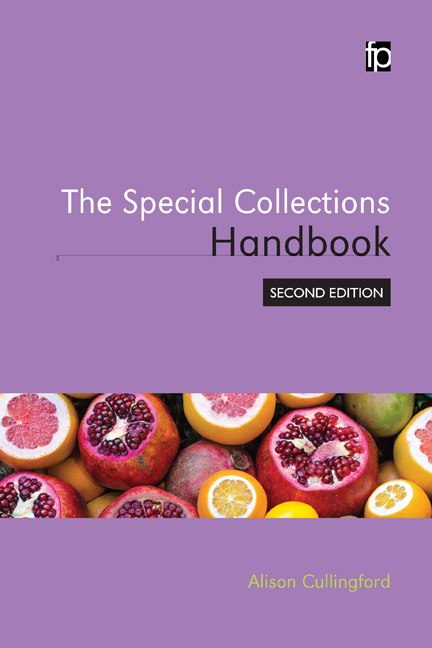Book contents
- Frontmatter
- Contents
- Preface and acknowledgements
- Introduction
- 1 The care of Special Collections
- 2 Emergency planning for Special Collections
- 3 Understanding objects in Special Collections
- 4 Acquiring and developing Special Collections
- 5 Cataloguing, description and metadata in Special Collections
- 6 Digitization and digital libraries in Special Collections
- 7 Legal and ethical issues in Special Collections
- 8 User services in Special Collections
- 9 Marketing and communications in Special Collections
- 10 Widening access to Special Collections
- 11 Organizational resources for Special Collections: space and people
- 12 Influencing and fund-raising for Special Collections
- Afterword: Special Collections futures
- Appendix A The Special Collections reference shelf
- Appendix B Skills for your Special Collections career
- Bibliography
- Index
1 - The care of Special Collections
- Frontmatter
- Contents
- Preface and acknowledgements
- Introduction
- 1 The care of Special Collections
- 2 Emergency planning for Special Collections
- 3 Understanding objects in Special Collections
- 4 Acquiring and developing Special Collections
- 5 Cataloguing, description and metadata in Special Collections
- 6 Digitization and digital libraries in Special Collections
- 7 Legal and ethical issues in Special Collections
- 8 User services in Special Collections
- 9 Marketing and communications in Special Collections
- 10 Widening access to Special Collections
- 11 Organizational resources for Special Collections: space and people
- 12 Influencing and fund-raising for Special Collections
- Afterword: Special Collections futures
- Appendix A The Special Collections reference shelf
- Appendix B Skills for your Special Collections career
- Bibliography
- Index
Summary
Introducing collections care
As stated in the Introduction, the care of collections is the basis of Special Collections work. Librarians need to decide what to preserve and why, and to what extent the information and the artefact can be separated. The choices made in caring for collections have long-term, often irreversible effects.
This chapter will:
Outline threats to collections and how to manage them. Threats include the physical composition of the objects themselves, environmental factors, pests and mould, buildings and storage, and handling.
Explore conservation and the role of the conservator.
Introduce preservation reformatting and the challenges of digital preservation.
Discuss how to bring all these ideas together in a collections care policy.
A note on terminology
The terminology of collections care can be confusing. I follow the definitions used in the current standard for cultural collections management, PAS 197 (British Standards Institution, 2009):
• Collections care: ‘range of activities intended to safeguard a collection. These activities can include organizational policies, security, storage, cleaning, maintenance, handling, scientific investigation, environmental monitoring and control, exhibitions and loans, conservation, provision of surrogates, and emergency planning.’ Collections care is also known as preservation and preventive conservation.
• Conservation: ‘interventive techniques applied to an item to achieve chemical and physical stabilization for the purpose of extending the useful life of the item to ensure its continued availability.’ Also known as interventive conservation and remedial conservation.
• Restoration is not defined in PAS 197: it usually implies an approach that aims to recreate an item as it was in a previous period.
A note on standards
Various guidelines and standards have been developed to assist organizations to provide appropriate levels of care for heritage materials. The key standards for UK libraries in 2016 are:
• PD 5454:2012 (British Standards Institution, 2012a) replaces BS 5454:2000 for storage and exhibition.
• PAS 198 (British Standards Institution, 2012b) on environment.
• PAS 197 (British Standards Institution, 2009) including collections care.
• The Archive Accreditation Standard (The National Archives, 2014) and the longestablished Museums Accreditation standard follow the structure of PAS 197. Archive Accreditation replaces the old Standard for Record Repositories.
• BS 4971:2002 (British Standards Institution, 2002) covering conservation work.
- Type
- Chapter
- Information
- The Special Collections Handbook , pp. 1 - 24Publisher: FacetPrint publication year: 2016



